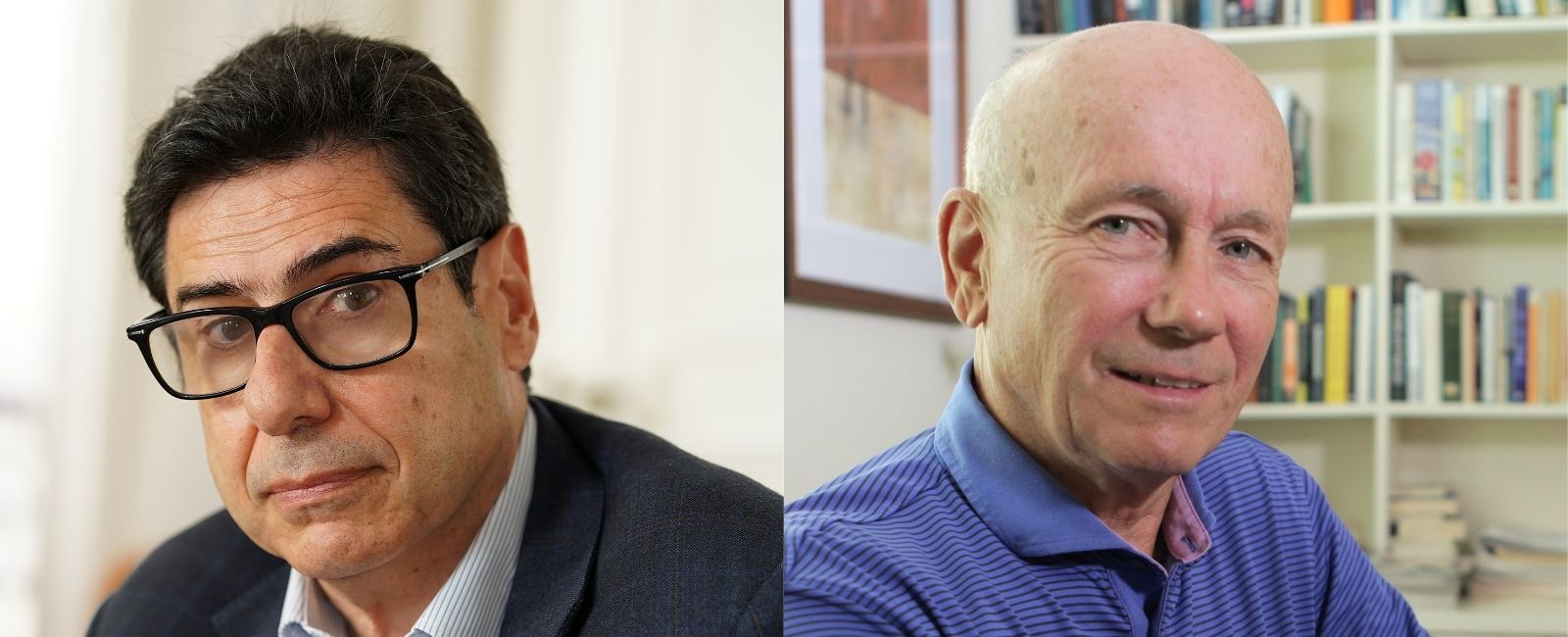
The Nobel Prize in Economic Sciences goes to Philippe Aghion and Peter Howitt, winners of the Frontiers of Knowledge Award in 2020
13 October, 2025
Aghion, Chair of the Economics of Institutions, Innovation and Growth at the Collège de France in Paris, and Howitt, Professor Emeritus of Economics at Brown University (United States), obtained the Swedish award alongside Mokyr (Northwestern University of Chicago, United States) for explaining “how innovation provides the impetus for further progress,” in an economic context of sustained economic growth over the last two centuries, which has lifted vast numbers of people out of poverty and laid the foundation of our prosperity, according to the committee’s citation. The three laureates show in different ways “how creative destruction creates conflicts that must be managed in a constructive manner,” the citation states.
John Hassler, Chair of the Nobel Committee for Economic Sciences, said: “The laureates’ work shows that economic growth cannot be taken for granted. We must uphold the mechanisms that underly creative destruction, so that we do not fall back into stagnation.”
In 2020, Aghion and Howitt received the BBVA Foundation Frontiers of Knowledge Award in Economics, Finance and Management for their “fundamental contributions to the study of innovation, technical change, and competition policy,” in the words of the award citation. The committee elected to share the award between the two economists who, it said, “have revived, developed in the framework of modern economic theory and validated empirically Schumpeter’s idea that productivity growth at the macroeconomic level stems from a process of creative destruction.”
The two laureates began collaborating in 1987, not long after Aghion joined the staff at MIT. There he met Peter Howitt, at the time a visiting professor. “It was Olivier Blanchard, a Professor of Economics, also awarded with the Frontiers of Knowledge Awars in its 14th edition (2024), who introduced us to each other – Howitt recalled – and suggested we might want to collaborate, as we had some ideas in common. He was quite right, I think, because we hit it off immediately and began to work on theories of economic growth. And we have been doing so ever since.”
“At the time we would talk in class about Schumpeter’s idea that innovation is important for growth, but we realized that what was lacking was a model,” added Philippe Aghion. And there the French researcher’s specialization in applied microeconomic theory found its ideal complement in the macro analysis that was the Canadian’s terrain.
A rich variety of applications
This “neo-Schumpeterian” framework, as it is generally referred to, quickly proved itself to be a powerful tool for a wide variety of applications, some of them developed by the authors themselves.
Working collaboratively, for instance, they have identified effective policies to foster innovation-led growth. These include subsidies to basic research, education, health, infrastructure, and a balanced tax policy; property right protection to safeguard innovators against imitators; and competition policies which ensure that incumbent firms cannot bar the entry of new innovators. They also emphasized the importance of insurance and protection policies: “We need a government,” said Aghion, “which protects firms and employees against shocks like the 2008 crisis, so that R&D investments and innovation survive those major setbacks.”
Howitt added his own reflections: “Which policies are best depends very much on a country’s specific situation, and especially on the level of development. In particular, strong protection of intellectual property rights is less important for countries that are struggling to catch up to the global technology frontier, who rely on copying or adapting existing technologies, than it is for leading countries that need to maintain incentives for frontier innovations.”
Asked about their work on the role of institutions in economic development, Aghion considered that it had “shown the importance of having, on the one hand, good intellectual property right protection for new innovations, to guarantee that innovation rents will not be dissipated and, on the other, effective competition policy, to make sure that incumbent firms (the innovators of yesterday) are not using their rents to prevent subsequent innovations and the entry of new players.”
In another major paper published in 2005 dealing with competition and innovation, they found that the relationship between these two parameters had an inverted-U or hump shape, with both very high and very low competition deterring innovation. “It also shows,” remarked the French economist, “that innovation and productivity growth reacts more positively to increased product market competition in more frontier firms, whereas innovation may react negatively to competition in less advanced firms.”
34 Frontiers awardees have gone on to win the Nobel Prize
The award of the Nobel in Economic Sciences to Philippe Aghion and Peter Howitt makes a total of 34 Frontiers of Knowledge laureates that have later won the Nobel Prize.
Fourteen Frontiers awardees have gone on to receive the Nobel Prize in Economics: Lars Peter Hansen (2013), Jean Tirole (2014), Angus Deaton (2015), William Nordhaus (2018), Abhijit Banerjee and Esther Duflo (2019), Paul Milgrom and Robert Wilson (2020), David Card (2021), Ben Bernanke (2022), Claudia Goldin (2023), Daron Acemoglu (2024) and Philippe Aghion and Peter Howitt (2025).
In the case of the Nobel Prize in Medicine, six Frontiers laureates were subsequently distinguished by the Swedish Academy: Shinya Yamanaka (2011), James P. Allison (2018), David Julius and Ardem Patapoutian (2021) and Katalin Karikó and Drew Weissman (2023).
The Nobel Prize in Physics has found its way to seven previous Frontiers awardees: Didier Queloz and Michel G. E. Mayor (2019), Klaus Hasselman and Syukuru Manabe (2021) Ferenc Krausz and Anne L’Huillier (2023), and Geoffrey Hinton (2024).
Finally, in the case of the Chemistry Nobel, the Swedish Academy has recognized the work of seven Frontiers awardees: Robert J. Lefkowitz in 2012, Emmanuelle Charpentier and Jennifer Doudna in 2020, David Baker, Demis Hassabis and John Jumper in 2024, and Omar Yaghi in 2025.

